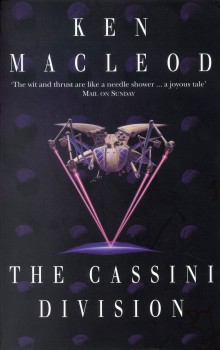 |
A shining example of a typical 4 star book. The Cassini Division. I only have a few quibbles. One is that it portrays the bad guys, the Jovians, as just evil people.
Yes, it is remarked in passing that maybe there were good Jovians, but then the person adds that they were probably all killed. Very flat characters, the Jovians were.
And too much seems to be happining - there's a trip to Earth, a chase scene, first contact, comets, trips through wormholes, journeys into the future, tense standoffs and full blown attacks (not necessarily in order). This is all made worse by the fact that the book is so short - less than 250 pages. As a result, Macleod has a propensity for data dumping, something any author should try to stay away from. You get the feeling that Macleod had a lot of good ideas for this book, but wanted the action to keep on moving.
Unfortunately, what happens is a rather stop-start motion of the book, with pauses and then frantic action. Perhaps if Macleod slowed down a little, developed the story and side-characters a little more, and extended the book by 150 odd pages, this would have received Four Gold stars, no less.
Perhaps I'm being a little too hard. I loved the Outwarder and the radio virus ideas. The whole concept of mechanical computers, or 'Babbages', and a civilisation which avoided radio transmissions at all costs was a breath of fresh air. This lent the novel a genuine individuality, and I'd be eager to see Macleod carry this idea along.
The narrative was well written, and the whole Solar Union/Cassini Division thing seemed fairly realistic, as well as the non-co idea. Lots of nice set-pieces, ultra-tech and other gadgets kept me happy enough. Possibly too happy, because there never seemed to be a real threat against the heroes of the story - the bad guys were always insubstantial, or they never posed an overwhelming threat.
Evidently Macleod is going into the fray of SF sociology, with the Solar Union's pseudo-communistic society. This was another thing I loved - the benevolent communists going wide-eyed into the unrestrained free-market capitalism of New Mars. Ellen Ngwethu's (the hero) retorts to the capitalists had me laughing out loud: 'Just you try it, you bankers!'
Well, it's hardly surprising Macleod managed to get the sociological side sorted out so well, when he had his mate Iain Banks along to help him out.
I also had an unexpected bonus upon buying the book, in that it'd been signed by the author himself. A good omen, perhaps.
In conclusion, The Cassini Division, despite its minor flaws, is a wonderful effort by an author so new on the SF scene.
The Cassini Division:
![]()
![]()
![]()
![]()
Click here to read the book's blurb